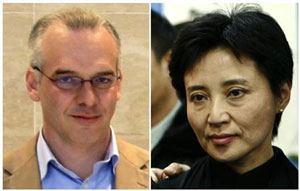27 Jul 2012 - {{hitsCtrl.values.hits}}
 China will try Gu Kailai, the wife of ousted Politburo member Bo Xilai, on charges of murdering a British man, state media said on Thursday in the latest turn in a scandal that has rocked the government in Beijing and could bring Gu the death penalty.
China will try Gu Kailai, the wife of ousted Politburo member Bo Xilai, on charges of murdering a British man, state media said on Thursday in the latest turn in a scandal that has rocked the government in Beijing and could bring Gu the death penalty.
28 Dec 2024 5 hours ago
28 Dec 2024 6 hours ago
28 Dec 2024 9 hours ago
28 Dec 2024 28 Dec 2024
28 Dec 2024 28 Dec 2024